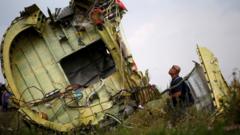This year's university entrance exams in Nigeria, conducted by the Joint Admissions and Matriculation Board (JAMB), faced significant turmoil stemming from technical glitches that left students unable to properly complete their tests. With nearly 80% of students scoring below the required threshold, calls for accountability have surged, particularly in light of a tragic suicide linked to the stress and despair caused by the exam failures.
Nigeria's University Entrance Exam Crisis: Tragedy, Outrage, and Technical Failures

Nigeria's University Entrance Exam Crisis: Tragedy, Outrage, and Technical Failures
The recent Nigerian university entrance exams revealed alarming technical issues, resulting in a low pass rate and tragic consequences, including a student's suicide.
In a disturbing turn of events, Nigeria’s university entrance examinations, overseen by the Joint Admissions and Matriculation Board (JAMB), have been plagued by significant technical problems, leading to widespread student dissatisfaction and even tragic outcomes. Reports indicate that about 80% of examinees scored below the 50% threshold typically required for university entrance, prompting outrage and heightened scrutiny of the examination process.
The exams faced multiple complaints from students, including issues with computer logins, unanswered questions, and power outages disrupting test-taking. These failures have driven students to frustration, with family members reporting that one candidate, 19-year-old Faith Opesusi Timileyin, tragically took her own life after receiving disappointing results for the second time. Her family revealed that she had aimed to study microbiology at university but ended up with a score significantly lower than her previous year’s performance.
JAMB acknowledged a "technical glitch" affecting many students’ results, sparking an apology from registrar Ishaq Oloyede, who expressed remorse over the distress caused. During a recent press conference, he announced that nearly 380,000 candidates from 157 exam centers would be allowed to retake their tests due to the widespread system failure, primarily focusing on the most affected regions such as Lagos and the southeast.
The Unified Tertiary Matriculation Examination (UTME), a digital test essential for university admission, has a history of technical disruptions, further complicating the academic futures of aspiring students. The exams body attributed the low performance rates to a crackdown on cheating, arguing that the results reflected the true academic capabilities of the candidates—an assertion met with skepticism and backlash from a public demanding accountability.
As frustration mounts, Nigerian social media platforms have been vocal, pushing for the resignation of JAMB officials and increased transparency in the examination process. Opposition figures and rights activists have also criticized the lack of adequate preparation and handling of such a crucial academic milestone, with calls for immediate reforms to prevent these issues in the future.
The consequences of this year’s exams underscore a pressing need for systemic improvements within Nigeria's educational infrastructure, as the cumulative impact of these failures continues to echo throughout the student community.


















